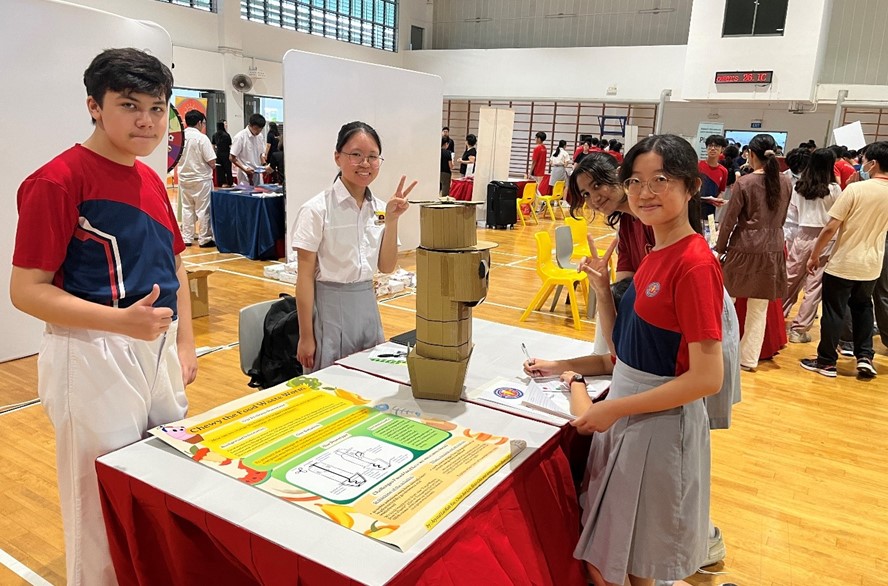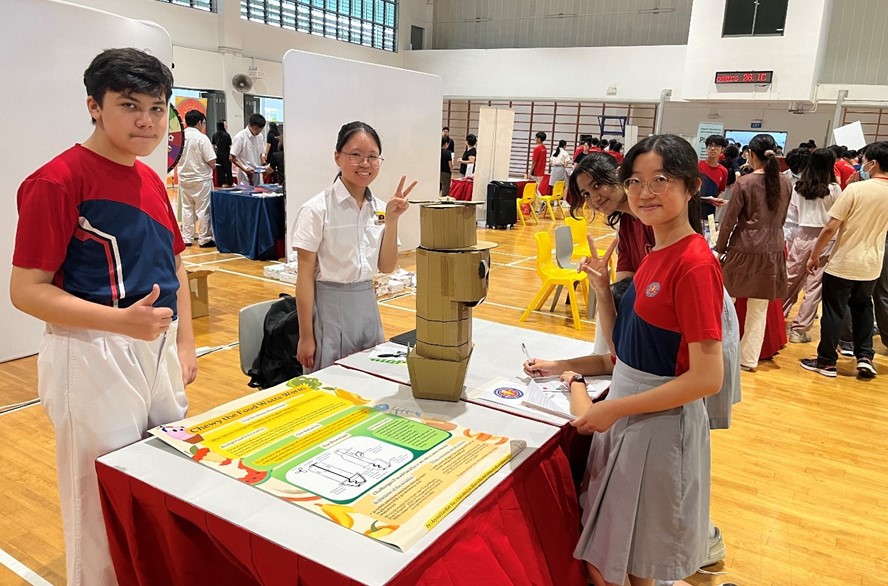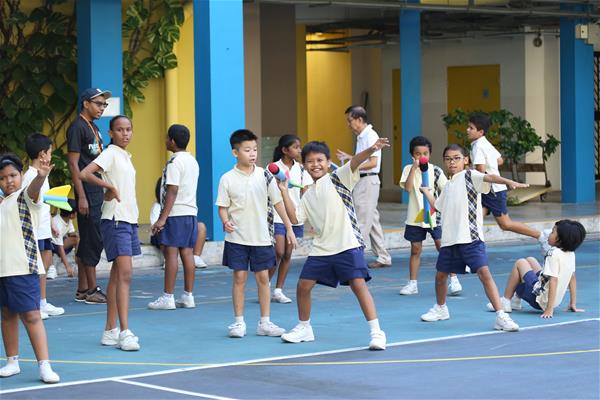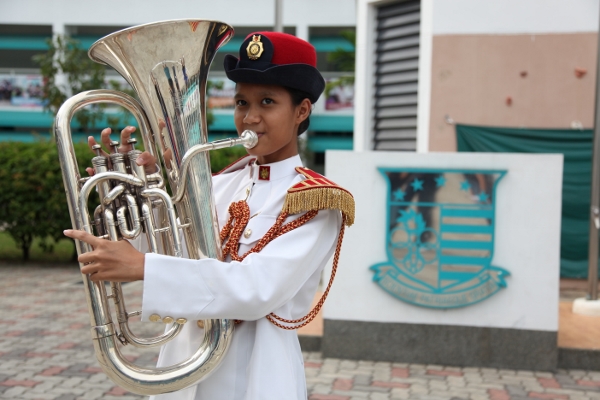Secondary 2 student Kevin Chioh discovered his inclination toward entrepreneurship when he was in primary school. His first “venture”: little polymer spheres his Dad used in their garden to water plants when they go on vacation. Known as water babies, these colourful balls swell up when they soak up water, then shrink back down as they release that water slowly. They looked cute to Kevin, so he wondered if his classmates would be interested in buying them as toys rather than tools.
As it turned out, the answer was yes, and Kevin made a respectable $80 from this venture. He even paid back his Dad, who had initially gifted him his inventory. “I like seeing the potential in an idea and if it can meet a customer need,” Kevin says. Hoping to develop these skills more, he applied for Bowen Secondary School’s Direct School Admission (DSA) Entrepreneurship & Innovation programme, and talked about his experience selling water babies during his admissions interview.
His story made an impression on the interview panel because “we look beyond academic achievements and leadership skills to identify students who demonstrate passion and potential in their chosen areas of talent”, shares Mr Jason Yap, one of the teachers who steers this programme in the school.
Kevin’s sharing showed his sense of curiosity and initiative, which is what Bowen Secondary wants to see as the teachers recognise that younger students may not have extensive portfolios or prior experience in innovation and entrepreneurship. “People who have an entrepreneurial mindset tend to be resilient, adaptable and able to think out of the box, so we look out for these qualities in students’ applications,” he adds. “The ability to collaborate, persevere, and communicate confidently is also important.”
Edgefield Secondary School’s DSA Innovation programme first shortlists candidates who have participated in related competitions or demonstrated innovation potential with personal projects in their portfolios.
“We also conduct group interviews to see how they communicate in this setting,” says Ms Toh Si Qi, one of the teachers in charge of the programme at Edgefield Secondary. By directing questions to the whole group, Ms Toh says the interviewers can see their alertness to opportunity. “Are they the first to raise their hands to share, or are they a bit quieter?”
To see how students think on their feet and take to teamwork, they are also asked to collaborate on solving a problem. Ng Guan Ming, now a Secondary 2 student in Edgefield, remembers being asked to work out how to pack an assortment of items into as little space as possible during this part of his application process. He had not expected such a task, but got into the spirit of the exercise as fast as he could. “I came up with different ideas, as did my group mates, and everyone chipped in to refine the ideas,” he says.
For Guan Ming, the appeal of this DSA programme lies in how it helps him explore his interest in innovation, which he also calls by another name – imagination. “I’m a big fan of horror stories, and I like to think out of the box by inserting supernatural elements into my compositions,” he says.
Here’s a closer look at how Edgefield and Bowen help their students hone their potential for entrepreneurship and innovation.
Innovation serves the community at Bowen Secondary School
ChANgeMakers programme
This programme is offered to all Bowen students, and combines the school’s Applied Learning Programme (ALP) and Learning for Life Programme (LLP). Its goal is to nurture students’ sense of innovation, empathy, and social responsibility, and train them to view problems as opportunities to engineer change.
For the ALP component, students learn about Design Thinking methodologies, and more recently, artificial intelligence. They then come up with ideas to improve the school environment. For the LLP component, students apply their problem-solving skills by helping community partners such as MINDS (Movement for the Intellectually Disabled of Singapore) and AWWA (Asian Women’s Welfare Association), which are in Bowen’s neighbourhood.
Kevin’s cohort, for instance, has visited MINDS beneficiaries to learn more about the activities used to engage these special-needs adults. He’s now brainstorming new ideas for games that would be suitable for them. “I’m a basketball player, so I want to design a basketball-based game that inspires them to shoot further, so they feel a sense of achievement,” he shares.
In upper secondary, students get to choose a social cause they want to champion, and continue to hone their needs-analysis and problem-solving skills. At all levels of this programme, they also work on their communication skills through presentations and reflection sessions.
Competitions and camps

DSA students take part in external competitions where they can further apply what they learnt in the ChANgeMakers programme, and get feedback from industry experts. Last year, for instance, Kevin took part in a competition at United World College Southeast Asia, where he showcased a weighing scale he had developed for unfinished food in the school canteen. It was coded to display different symbols so students would know how much food wastage was taking place.
DSA students also take part in external camps that train them in areas such as innovative thinking. There are plans in the pipeline to link students up with community and innovation partners overseas.
At Edgefield Secondary School, innovation is honed through hands-on projects
Future Ready Project (FRP)

All lower secondary students at Edgefield Secondary spend one hour every two weeks working on the FRP, which involves examining problems related to climate change, diversity, sustainability, security, and health. To do that, they learn Design Thinking methodologies, such as prototyping and implementing solutions.
Students who come in through the DSA Innovation route get additional training in divergent-thinking skills, and then share these concepts with their peers. They also lead their FRP groups by evaluating different ideas that surface during the project.
For his FRP, Guan Ming’s group wanted to help teenagers recognise fake news online, and ultimately created a boardgame-card game to do so. From navigating this process, he learned that “you have to get everybody to compromise, and combine different ideas,” he shares.

Student leadership
In line with Edgefield’s vision of nurturing collaborative innovators and compassionate leaders, DSA students also take on student leadership positions. As a peer support leader, for instance, Guan Ming has been involved in initiatives that foster peer bonding and help new students adjust to Edgefield. “This helped me to realise that when it comes to innovation, it’s not just about numbers,” he says. “I need to understand people’s personal perspectives and experiences.”

Another way these students lead is through evaluating and improving school initiatives. Secondary 1 student Ong Shi Jia, for example, is part of a project to make the campus more conducive to student interaction and well-being. So far, her group has conducted a survey of the student population to ask for ideas on which school area they would like to see used for student activities. They then came up with a proposal based on this feedback. “We are preparing to present our ideas to the principal, and get more feedback.”
The DSA programme offers many such opportunities to sharpen her communication skills, she says. “I have become more confident at expressing myself, and can think more creatively.”






